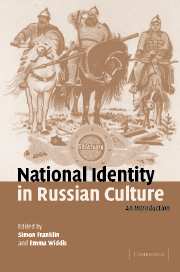Book contents
- Frontmatter
- Contents
- List of illustrations
- Notes on contributors
- Preface
- Note on the transliteration of Russian
- Map: The growth and contraction of Russia and its empire
- 1 ‘All the Russias …’?
- SECTION I IDENTITIES IN TIME AND SPACE
- 2 Russia in time
- 3 Russia as space
- SECTION II CONTRASTIVE IDENTITIES: ‘US’ AND ‘THEM’
- SECTION III ‘ESSENTIAL’ IDENTITIES
- SECTION IV SYMBOLS OF IDENTITY
- Afterword
- Notes
- Selected further reading in English
- Index
2 - Russia in time
Published online by Cambridge University Press: 04 May 2010
- Frontmatter
- Contents
- List of illustrations
- Notes on contributors
- Preface
- Note on the transliteration of Russian
- Map: The growth and contraction of Russia and its empire
- 1 ‘All the Russias …’?
- SECTION I IDENTITIES IN TIME AND SPACE
- 2 Russia in time
- 3 Russia as space
- SECTION II CONTRASTIVE IDENTITIES: ‘US’ AND ‘THEM’
- SECTION III ‘ESSENTIAL’ IDENTITIES
- SECTION IV SYMBOLS OF IDENTITY
- Afterword
- Notes
- Selected further reading in English
- Index
Summary
In the late 1990s a book was published in Moscow with the same title as this chapter: Russia in Time. I quote from its conclusion: ‘Across the vast Eurasian land mass … in the fourth to the second millennium BC’ the written culture of the ancient Slavs, ‘whose sounds are close to those of modern Russian … gave rise to the following civilisations: Sumerian, Babylonian, Proto-Indian, Cretan, Ancient Greek, Ancient Roman (and eventually European)’. This kind of grandiose claim about a Russia spanning the millennia is a fairly typical product of the post-Soviet boom in amateur history. The shelves bulge with ever more ambitious assertions: that the ancient Etruscans were ancestors of the Russians; that Jerusalem was a Russian city, and that Christ was therefore a Russian prophet. Or, by complete contrast, according to one particularly fashionable theory: nothing in world history is more than about a thousand years old and Alexander the Great is a fiction invented around the time of Tsar Ivan IV (the Terrible) in the sixteenth century. In the chaotic freedom of post-Soviet popular publication, Russia in Time has become strangely elastic.
Historians wince. But the point, for present purposes, is not whether such schemes are true or false (in almost all cases they are utter claptrap), but the shared preoccupation with the shaping of time; the assumption that the way we shape time has significance for determining who ‘we’ are; the belief in linear narratives through time as the key, or a key, to something which might commonly be termed ‘historical’ identity.
- Type
- Chapter
- Information
- National Identity in Russian CultureAn Introduction, pp. 11 - 29Publisher: Cambridge University PressPrint publication year: 2004
- 16
- Cited by



